Animal shelters do incredible work giving pets a second chance. Some animals arrive at shelters in shocking condition, but they still step up to give them the love and care they need.
That was the case for a dog named Libby, who had a tumor the size of a volleyball. But now, her story has a happy ending.
In August, the Humane Society for Tacoma and Pierce County, in Washington state, took in a stray pit bull named Libby. They said the dog was “full of life” and had a “sweet face and kind eyes.”
However, Libby also had a serious medical concern: a 10-pound tumor the size of a volleyball, one of the largest masses they had ever seen:

Libby arrived at a hectic time for the shelter: HSTPC says Libby was just one of three urgent cases they responded to in 48 hours, and as Washington’s largest-intake shelter dozens of new animals were arriving every day.
Despite that, they resolved to give Libby the best possible care, even though they weren’t sure what the future had in store for the poor dog.
“She deserves the most compassionate care possible, but we don’t know what her outcome will be at this time,” the shelter wrote in August. “Our veterinary team is working on every possible option and will start with testing to understand what kind of tumor Libby has. For now, she is receiving pain medication to ease her discomfort and endless love from our staff.”
After giving Libby an x-ray, they discovered the tumor was in the bone of her upper right leg, and would require amputation. Reactive inflammation caused the tumor to swell to its unusual size, and was causing her agonizing pain.
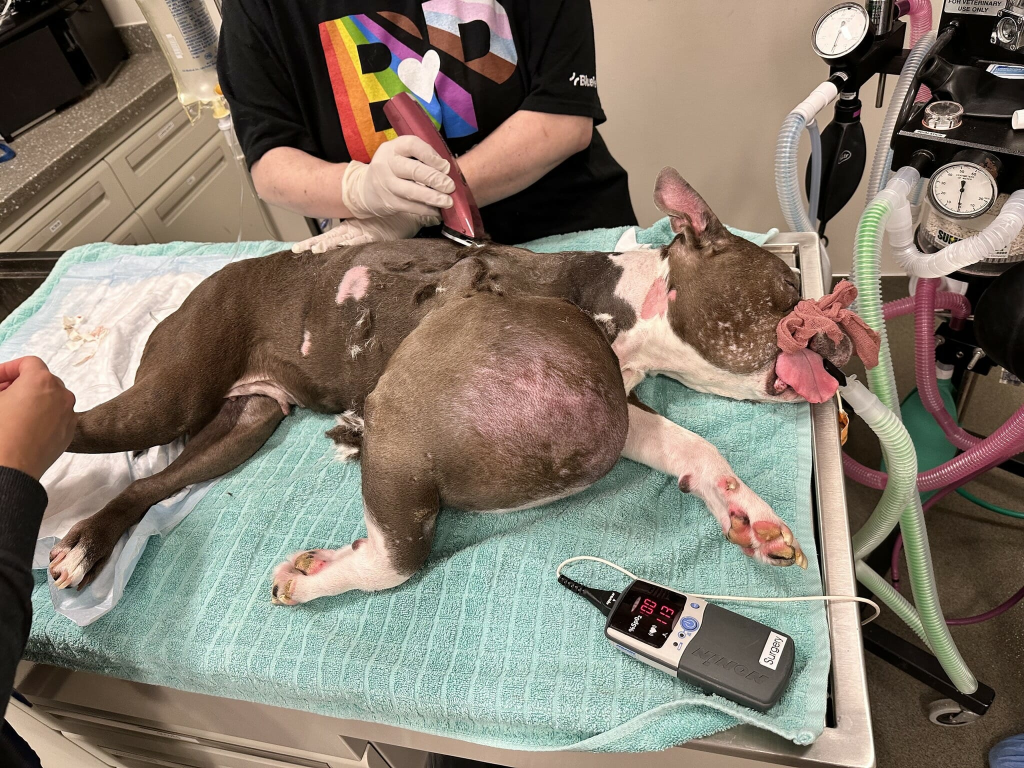
Through generous donations from supporters, the shelter was able to pay for Libby’s leg amputation. The surgery, done by the vet staff at BluePearl Pet Hospital, was a success and Libby was finally free of the pain she had been living through.
Sadly, even though her tumor was gone, she was diagnosed with aggressive bone cancer, and her time on earth might be limited. But in happy news, Libby has found a home!
According to HSTPC, a vet tech fell in love with Libby and agreed to adopt her. Even though she knows that Libby might not live long, she wanted to fill her remaining days with love.
“There’s something in her eyes that begs for love and safety,” her new adopter said, according to a Facebook post. “I couldn’t turn away from that.”

Libby has now been renamed “Wiggles” and is enjoying her new home, playing with her dog brother and family and taking lots of cozy naps on the couch.
“Though we’re uncertain how much time she has left, we know she’ll spend her remaining days
Are playful dogs smarter? Study finds link between learning and romping
Canine eggheads enjoy playing with toys and retrieving objects.
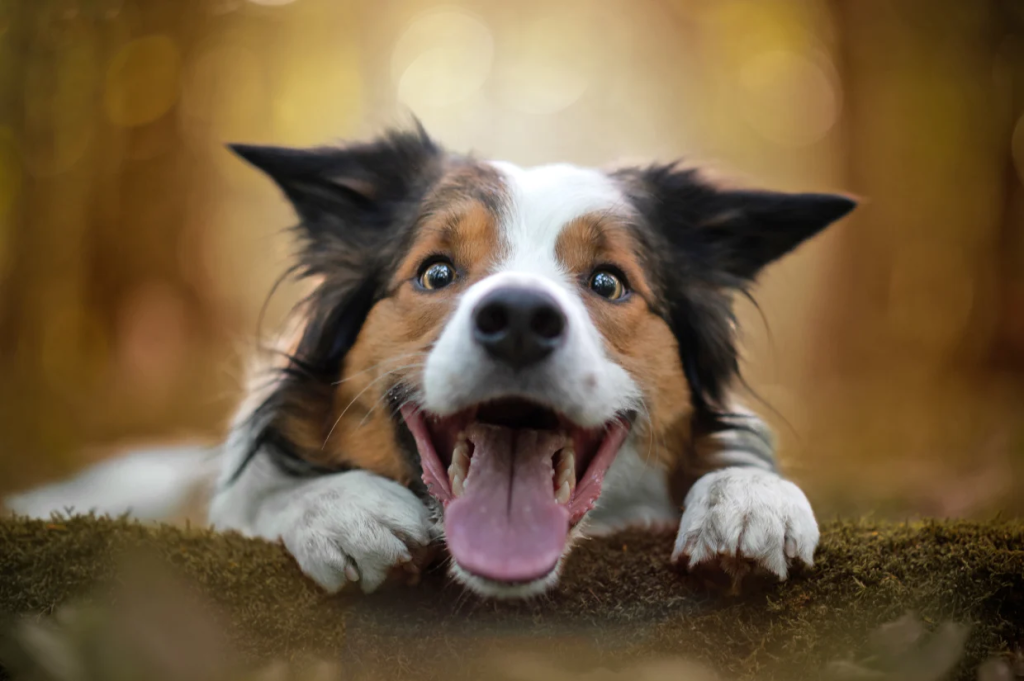
“Gifted” dogs, who have a rare talent for learning lots of words for objects easily, also turn out to be more playful than other dogs, a new study finds.
Prior research in humans has shown a link between playfulness and problem-solving abilities, so animal behavior researchers from Eötvös Loránd University in Budapest, Hungary, wondered if the same was true for rollicking pups.
What is a gifted dog? In the new study, it was Border collies who had proven in prior research that they were able to learn as many as 12 new words per week and then retain them for months.
To take a closer look at the possible association between giftedness and playfulness in dogs, Claudia Fugazza, a researcher in the university’s department of ethology (the study of animal behavior), and her colleagues asked the owners of 165 Border collies to fill out dog personality questionnaires. Twenty-one of the dogs were gifted and the other 114 were just randomly selected with no testing for word learning ability.
The surveys assessed the personality of the animals in five categories:
- Fearfulness, including fear of people, nonsocial fear, fear of dogs, fear of handling.
- Aggression toward people, including general aggression and aggression in certain situations.
- Activity/Excitability, including excitability, playfulness, active engagement and companionability.
- Responsiveness, such as trainability and controllability.
- Aggression toward animals, including aggression toward dogs, prey drive and dominance over other dogs.
For the evaluation of playfulness the owners were asked to rate their dogs in three areas:
- Dog gets bored in play quickly.
- Dog enjoys playing with toys.
- Dog retrieves objects, such as balls, toys and sticks.
The researchers focused solely on Border collies because earlier experiments found that the breed is more likely to be good at learning new words compared to others.
After collecting the survey responses, the researchers then compared the responses from owners of gifted dogs to those from the owners of dogs who had not been identified as gifted.
Playfulness was the only personality trait that was consistently different between the two groups.
It’s not clear from the study whether it’s the playfulness that helps the dogs learn more words, or whether the extra playful ones ended up with more opportunities to learn, said Fugazza, the study’s lead author, said in an email. That’s because gifted dogs tend to learn words for objects when their owners are playing with them.
Are playful dogs smarter?
Not exactly.
“Intelligence is the result of diverse cognitive traits that allow individuals to flexibly solve different types of problems,” Fugazza explained. “Giftedness refers to an extremely good capacity in the case of a specific skill.”
So, maybe gifted dogs are like people who score high on the verbal part of the SATs.
If your pup doesn’t learn words easily, it doesn’t mean it’s a dumb dog. Adam Boyko, an expert in canine genomics, reassures owners that canine intelligence is more than that.
“Both dogs and wolves are playful when they are puppies, but dogs really evolved to living in the human environment and to responding to social cues,” said Boyko, a specialist in the genetics of behavior and an associate professor at the Cornell University College of Veterinary Medicine. “It’s not surprising that the more playful ones exhibit better learning in the domain of learning human words. And it’s not surprising that Border collies, who are bred to respond to human cues, show the propensity to learn words more than other breeds.”
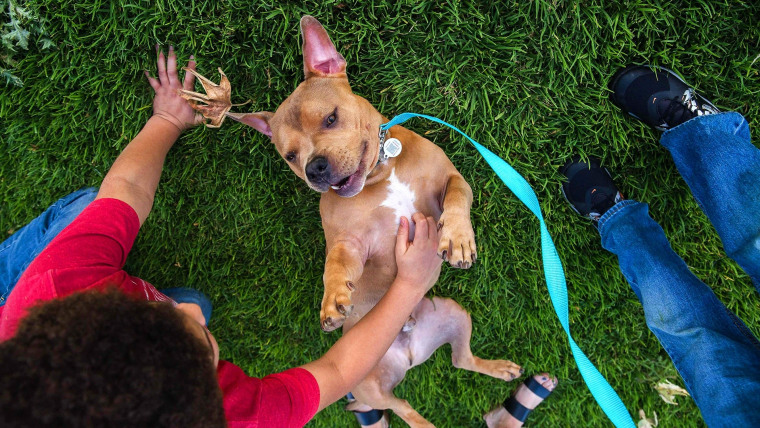
Other breeds of dogs might show intelligence in other ways, Boyko said. For example, wolves are very intelligent although they don’t typically pick up on human cues.
“But they can figure out how to escape,” said Boyko. “Where dogs would look for a person to help, wolves would see how humans did a latch and lock and then the wolves would do it themselves to get out.”
Boyko would like to take the study a step further and look at the genetics of the gifted dogs.
“This is a tantalizing correlation that might be meaningful if you are trying to build better service dogs,” he said.
One thing that can’t be determined from the study is whether the playfulness trait spurred owners to interact more with their dogs and thus teach them more words, said Dr. Nicholas Dodman, a professor emeritus at the Cummings School of Veterinary Medicine at Tufts University, CEO and president of the Center for Canine Behavior Studies and the author of “Pets on the Couch: Neurotic Dogs, Compulsive Cats, Anxious Birds and the New Science of Animal Psychiatry.”
Dodman said the study is interesting but needs to be replicated in a larger number of dogs.
“I would also like to see it done in a different breed,” he said.
The new findings might help people who want to buy or adopt a puppy. It suggests that playfulness might be a good attribute to consider.
“The playful ones might be more likely to interact with a person, assimilate words more easily and be more intelligent,” said Dodman.
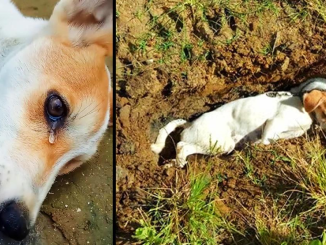
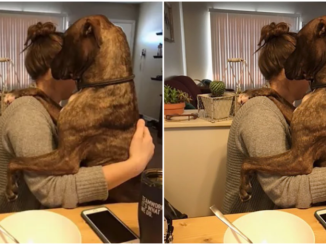

Leave a Reply